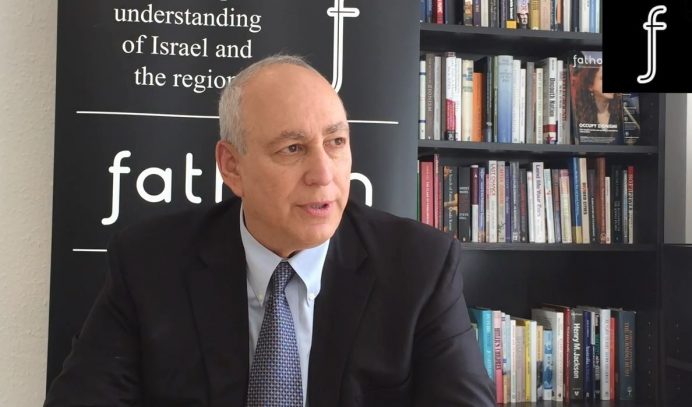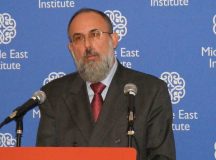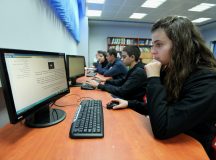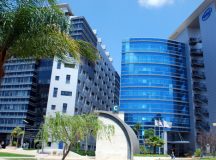Chemi Peres is the chairman of the Peres Centre for Peace and Innovation, founded by his father Shimon Peres in the 1990s to advance a vision of Israeli-Palestinian peace. Peres is one of Israel’s innovation and venture capital pioneers, having invested in over 250 enterprises. He spoke to a Fathom Forum audience in London about the potential for Israeli economic and technological success to spark growth in the wider Middle East: from ‘start-up nation’ to ‘start-up region’.
The necessity of innovation: a lesson from my father
The story of my father’s life is a story of innovation. When he arrived in Israel with his family everything he did was innovative, entrepreneurial, forward-looking and done with a lot of optimism. You can observe four major stages in his life, during which he had to deal with different kinds of innovation, technology and entrepreneurship. The first was building a nation and populating the land. This required a lot of creativity in building up know-how and technologies in areas such as agriculture and water. Israel was a dry land that was difficult to cultivate. But the pioneers needed to provide for the newcomers and for those already living there. As a young man he had to deal with being an entrepreneur, in settling a new kibbutz, in building a community, and on working on science and technology that could provide for the entire nation in Israel.
The second phase was building an Israeli defence industry. Again, science, technology and innovation were the core tools that he used. From Dimona [Israel’s nuclear energy site] to the Israeli aerospace industries to the Iron Dome, Israel’s military defence infrastructure is based not only on computers and software, but also on brilliant minds. This allows Israel to withstand whatever threats the Middle East might pose.
The third phase was the economy. When my father became prime minister for the first time in the early 1980s he inherited a collapsing economy. It had an inflation rate of 400 per cent. The whole ecosystem in Israel was falling apart, and he realised that if you don’t build your economy on science, technology and innovation — on brain power as opposed to natural resources — then you are doomed to fail. He was one of the biggest promoters of what we know today as the start-up nation, helping young people to start companies, creating the right climate for innovation and entrepreneurship (which emerged initially from the defence industry), and inviting global enterprises to invest in Israel. New investment brought know-how and global connections.
The fourth phase was the emergence of the Peres Centre for Peace and Innovation. This phase was about transforming the Middle East from an old world to a start-up region. The lesson of Israel is that there are two main components that drive economic prosperity. The first is global enterprises; in Israel today we have 350 multinational companies which are constantly innovating. They employ Israeli engineers to work in innovation labs, they develop new products, they develop new creative ideas, and they market products to the entire world. They are the driving force behind the innovation engine — 50 per cent of our innovation comes from companies like Facebook or Apple.
The biggest companies in the US today are technology companies: Amazon, Alphabet, Facebook and Apple. All of them have major operations in Israel. Apple set up its first ever R&D centre outside the US in Israel.
The second component of the engine that is driving Israel into the future is the start-up community. We have 6000 companies in Israel in various technology sectors that are helping the global economy through the wave of digitisation, transforming non-digital industries into digital industries, and contributing to the developments in artificial intelligence and machine learning. These companies receive roughly US $6bn worth of investment annually.
Moving from start-up nation to start-up region: our challenge today
My father believed that nations today have an opportunity that they have not had in the past: to build a great nation without doing so on the back of other nations. Instead of building armies and going to war to conquer more natural resources and cheap labour, a nation can achieve prosperity through science and technology. If you need energy then you can harvest energy through technology. If you need water then you can purify or desalinate it from the sea. There is no need to go to war any more in order to achieve greatness.
That’s the message the Peres Centre for Peace and Innovation has set out to spread: to write a new chapter in the story of the region by turning the Middle East into a ‘start-up region’. How do you go about this? You need to look at Israel as a case study for the Middle East.
Israel works with its own Arab communities; 20 per cent of Israeli society is Arab. They can speak Arabic; they can travel freely in the region and have contacts in the Arab nations.
This is the opportunity that the Middle East has. There are 400 million people in the Middle East that live in 22 countries. We have another 50 to 60 million people living outside of the region. All of them speak the same language. It may be in different dialects but they share the common denominator of the Arabic language. There is an opportunity for the Middle East to create a unified market around that language, and help new and small companies to expand their business via the network.
It can become a place that provides opportunities for young people to start new businesses. Today, new jobs are being created around the world by new companies, not necessarily the incumbent ones, by tapping into innovation. As a result all the global enterprises are moving into the centre of every city, and the younger generation is following the creators and the artists to start new things. The world is creating jobs through the young generation, which is why we have to give an opportunity to the young generation in the Middle East.
And we are not in short supply of young minds. The Middle East is the youngest region in the world. Sixty per cent of its population is below the age of 30, the average age is below 26. But youth unemployment is a massive problem in the region. In order to turn the Middle East into the start-up region we need more investment from global enterprises, more opportunities for the young generation, more incubators and more innovation labs. Offering a new horizon of opportunity for the young generation in the Middle East will be the best answer to poverty, extremism and terrorism.
The Middle East is not only the youngest region, but also the slowest growing region in economic terms. Multinational enterprises usually refrain from making investments in such areas, but in today’s world, we cannot leave any society behind. Over time the world becomes more connected through global networks. Companies refrained from investing in China 30 years ago, and from investing in Africa 20 years ago, but today both attract inward investment.
As my father foresaw 20 years ago, terrorism has become globalised; neither oceans nor mountains will protect societies from it. As the world becomes more globalised, more responsibility for our future rests with global enterprises, entrepreneurs and innovators. Our job, the job of the investors, entrepreneurs and innovators, is to reach out and to connect beyond borders and help the Middle East transition itself from a poor region to a start-up region.
Questions and Answers
Question 1: What is the relationship between prosperity and peace?
Chemi Peres: At the Peres Centre we don’t make predictions about what will happen politically. Instead, we build from the bottom up. We bring people together, and have been doing so for over 20 years, especially members of the younger generation. We bring together Jews and Arabs, Muslims and Christians, boys and girls; people from all walks of life.
To create the Arabic-speaking internet market we must improve the region’s gross domestic product (GDP). GDP in both the West Bank and Jordan is quite low. On the other hand, countries such as Saudi Arabia and the Gulf states, which have a higher than average GDP for the region, are becoming the prime markets, though the market is by no means homogenous. It is in these countries that companies can utilise advertising agencies to generate their revenues and build their business. Yet, the areas for R&D are within the Israeli-Arab community, the Palestinian community and the Jordanian community. These are the places where you start to see more and more engineers, entrepreneurs, start-ups and R&D centres. Egypt too.
Over time the regional marketplace will become much more unified. For many companies who are focusing on the Arabic-speaking internet market, the next step in their growth is to expand their operations to areas such as Turkey and other non-Arabic Muslim countries. Some of them are already starting to address the global, not just the regional market.
Today we are already seeing the beginning of incubators, accelerators and funds that are cultivating this kind of advance. We are already starting to see unicorns (a company with a stock market valuation or estimated valuation of more than US $1bn) being created in the region. One of these is Carrem, the shared ride operator that is a joint venture of a few founders from the region and from Europe. Carrem is considered to be the most successful car-share app in the Middle East. We have also seen that Souk was acquired by Amazon in a deal worth about US $700m.
In the Israeli-Arab sphere there is more and more interest among the younger generation to get into technology, entrepreneurship and innovation. There are Palestinian funds, joint Israeli-Palestinian funds and some Israeli companies are beginning to develop R&D centres in Ramallah — one example is Freightos, a freight management company, which has 70 engineers in Ramallah managed by an Arab executive they recruited from Amazon. And many other Israel companies employ Palestinians, such as Menalux, an Israeli company, which employs over 100 people in the West Bank and in Gaza. We are starting to see incubators in Ramallah, in Gaza, in the Israeli-Arab community, in Lebanon, and in other areas too.
This is a movement taking its first steps. It’s clearly not as developed as we would like, but it’s much more advanced than people know. Most of these activities take place under the radar. For example, the Sadara fund is investing in early stage Palestinian software companies, and they are now raising their second fund.
The Israel-Arab scene is getting to the same stage Israel was at in the 1990s. I believe that their ability to accelerate is better than Israel’s was in the 1990s, as they have better networks which allow you to expand your business faster.
The call for action that we issue from the Center is this: reach out to the young generation. We are not dealing with the political movements. We cannot play a role in this, certainly not as the Peres Centre for Peace. But we say that at the end of the day we have a young generation that needs to live together and build a shared future.
Before my father passed away he wrote a book, which was published this September, called No Room for Small Dreams (Weidenfeld and Nicolson, 2017) in which he tells the story of his life through his major dreams and achievements. We hope that this book, together with what the Centre is doing, will serve as an inspiration for both the young generation and the global enterprises to move forward and drive the Middle East in the right direction.
Question 2: How can we spread the word about the progress that has already taken place in Israel and about the potential to create a ‘start-up region’?
CP: Multinational companies are best placed to spread the word about the potential of the start-up region. By building and expanding their influence in the Middle East, these actors can create a new market for themselves. They will be able to create new success stories in the form of the acquisition of start-up companies in the region by global companies.
This is what happened in Israel. In the early 1990s most of the success was derived by young companies being acquired by global enterprises. And now the global enterprises are expanding their presence in the local market. For young companies to build themselves up to a point where they can go public is a very long journey and will take many years.
Success is based on global enterprises coming into the region, identifying and investing in new opportunities, and in doing so they create a presence that will then ignite more entrepreneurship. These are the lessons we learned in Israel. Today Israel is shifting gears and is moving away from early stage acquisitions to creating leaders. We see more Israeli companies aiming to go public, to become the acquirers as opposed to the acquirees, and a change from a start-up nation to a growth nation.
In the last five years we’ve seen US $2bn a year invested in start-up companies, as well as an additional US $4bn invested solely for growth. This rise is a result of more companies sustaining themselves for longer runs and by recruiting more funding to accelerate growth. Israel is a little bit ahead of the region in many ways.
But looking back at how it started, I think global enterprises working with universities and start-up companies, making acquisitions, and creating more critical mass would drive the start-up region just like it did for Israel.
Question 3: What do you think it will take for the multinationals to really step into the region, given the current conditions?
CP: What is needed is cultural change in the leadership of the multinationals. They need to understand, and this was something that my father preached to every CEO he met, that they cannot focus solely on financial returns. They have a bigger role. We are in a transformative period where the younger leaders of the global companies are challenging the cultural status quo. They understand that they have a bigger mission in life than just building great financial companies; they need to embrace their corporate social responsibilities, and if they don’t do so they will pay the price.
One of the best proponents of this cultural change is Mark Zuckerberg. His speech when receiving his honorary doctorate from Harvard was about Facebook connecting the world. He is talking about purpose and building communities. This is exactly what the region needs; the challenge is how to convince them to do what it is that they know they have to do.
Unfortunately, I don’t think much of the world is offering that kind of leadership today. In fact, many countries are moving backward as opposed to forward, and drawing behind their borders.
Question 4: What is being done to encourage Israeli-Arabs to be more involved in the high-tech sector? Also, how does the Boycott, Divestment and Sanctions (BDS) campaign affect the work you are trying to do?
CP: The Israeli government is doing a lot in order to promote entrepreneurship and technology in the Arab sector. The Israeli government started the first fund that invested in Arab start-up companies. Second, the Israeli National Authority of Innovation has a special incentive programme for Arab entrepreneurs, as well as for ultra-Orthodox entrepreneurs. If you are starting a company and you are an Arab or an ultra-Orthodox entrepreneur the government will provide 85 per cent of the first round of funding if you can find an investor to put in 15 per cent of the funds.
Of course this is only part of what the government is doing. The government also has a 15bn shekel project to upgrade infrastructure in the Arab communities. The idea is not to look at the Arab community as a remote community, but as a community that we need to bring together with the Jewish community, and more and more companies are trying to do this.
The Peres Centre is working with global enterprises to recruit and employ Arab engineers. The Arab community in Israel is highly trained and highly skilled. They go to the same universities and 20 per cent of our graduate population is Arab. Many of these students graduate in healthcare and technology industries but have to go through a different route from Israeli Jewish students, because most of them do not do military service, which is the main recruitment area for the technology sector. But we see more and more Arabs beginning to get into start-up companies.
With regards to your second question about BDS, I would like to share with you something former US President Bill Clinton once said to my father. He said: ‘Too many people in the world put too much time and effort into making sure bad things will not happen, very few people put enough time into making sure good things happen.’ Fighting BDS is making sure bad things do not happen, and it’s definitely important work. But the work that we choose in the Centre is not what we work against, but what we work for. That’s were our focus is, making good things happen. We have great respect for those who fight BDS and anti-Semitism. But our mission statement is a little bit different, we try to look at what can be done, and inspire people to achieve this.






































Comments are closed.